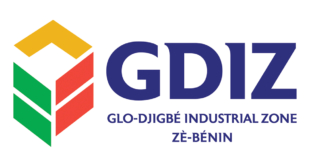For decades, the Republic of Benin has been known for its predominantly agricultural economy. Today, the country is undergoing a profound transformation through strategic initiatives designed to diversify its sources of revenue and stimulate industrial development. At the heart of this transformation is the Glo-Djigbe Industrial Zone — an ambitious project conceived to catalyze the structural transformation of Benin’s economy.
Covering an area of 1,640 hectares, the creation of the GDIZ is a flagship project under President Patrice Talon’s Government Action Program, which places a strong emphasis on economic diversification and the promotion of industrialization. This strategic initiative aims to attract foreign investment, boost local production and create jobs, while reducing the economy’s dependence on agriculture.
Situated close to Cotonou, Benin’s economic capital, the GDIZ benefits from a prime geographical position, offering easy access to key regional and international markets. The zone boasts modern infrastructure, including well-maintained road networks, reliable water and power supply and seamless access to the Port of Cotonou and Cardinal Bernardin Gantin International Airport. These logistics assets are critical to ensuring the efficient movement of goods and optimized supply chains.
To encourage investment, the government of Benin has introduced a comprehensive package of fiscal incentives and business-friendly measures. These include tax exemptions and streamlined administrative procedures. Furthermore, the country’s political stability and the government’s commitment to supporting industrial projects significantly strengthens investor confidence.
The GDIZ is not limited to one sector. It is home to companies operating in a wide range of industries, including agro-processing, agricultural value addition, textiles and garments, building materials manufacturing and technology. This multisectoral approach fosters the creation of integrated value chains, thereby enhancing the resilience of Benin’s economy to external shocks.
The development of the GDIZ has a profound impact at both the local and national levels. By 2030, the project is expected to generate 300,000 direct jobs, along with many more indirect opportunities, contributing to a reduction in unemployment and a tangible improvement in living standards. In addition, the increase in local production capacity will reduce import dependency, improve the trade balance and strengthen Benin’s economic sovereignty.
The GDIZ is a cornerstone of Benin’s structural economic transformation, paving the way for an era of industrialization and sustainable growth. With its dynamism and immense potential, the GDIZ embodies a promising future for a Benin that is firmly committed to progress and prosperity.
The GDIZ is emerging as a key driver of industrial transformation in Benin, offering opportunities for visionary investors, manufacturers and innovators. By setting up in the zone, stakeholders gain access to a strategic location, modern infrastructure, a competitive investment framework and the support of a government committed to advancing the country’s industrial future.






